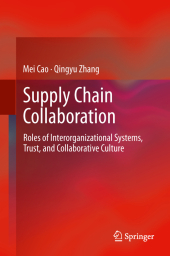 Neuerscheinungen 2014Stand: 2020-02-01 |
Schnellsuche
ISBN/Stichwort/Autor
|
Herderstraße 10
10625 Berlin
Tel.: 030 315 714 16
Fax 030 315 714 14
info@buchspektrum.de |

Mei Cao, Qingyu Zhang
(Beteiligte)
Supply Chain Collaboration
Roles of Interorganizational Systems, Trust, and Collaborative Culture
2013. 2014. xiv, 198 S. 41 Tabellen. 235 mm
Verlag/Jahr: SPRINGER, BERLIN; SPRINGER, LONDON; SPRINGER 2014
ISBN: 1-447-16215-3 (1447162153)
Neue ISBN: 978-1-447-16215-5 (9781447162155)
Preis und Lieferzeit: Bitte klicken
This book conceptualizes supply chain collaboration as seven interconnecting elements including information sharing, incentive alignment, goal congruence, decision synchronization, resource sharing, as well as communication and joint knowledge creation.
To survive and thrive in the competition, firms have strived to achieve greater supply chain collaboration to leverage the resources and knowledge of suppliers and customers. Internet based technologies, particularly interorganizational systems, further extend the firms´ opportunities to strengthen their supply chain partnerships and share real-time information to optimize their operations. Supply Chain Collaboration: Roles of Interorganizational Systems, Trust, and Collaborative Culture explores the nature and characteristics, antecedents, and consequences of supply chain collaboration from multiple theoretical perspectives.
Supply Chain Collaboration: Roles of Interorganizational Systems, Trust, and Collaborative Culture conceptualizes supply chain collaboration as seven interconnecting elements including information sharing, incentive alignment, goal congruence, decision synchronization, resource sharing, as well as communication and joint knowledge creation. These seven components define the occurrence of collaborative efforts and allow us to explain supply chain collaboration more precisely. Collaborative advantages are also divided into five components to capture the joint competitive advantages and benefits among supply chain partners.
The definitions and measures developed here examine some central issue surrounding supply chain development but this is also followed up with real-life managerial practicalities. This balance of theory and practical application makes Supply Chain Collaboration: Roles of Interorganizational Systems, Trust, and Collaborative Culture a strong resource for industry practitioners and researchers alike.
Preface.- Acknowledgements.- 1.Introduction.- 2.Theory and Theoretical Framework.- 3.Antecedents of Supply Chain Collaboration.- 4.Supply Chain Collaboration Characterization.- 5.Collaborative Advantage As Consequences.- 6.Structured Interview and Q-Sort.- 7.Large-Scale Analysis and Testing.- 8Research and Managerial Insights.- Appendix: Measurement Items, Criteria, and Questionnaire


